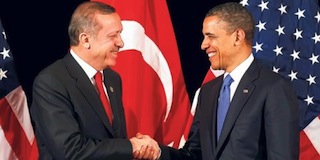President Obama’s desire to prove he was “engaging” the Muslim world led to a policy of fostering very close ties with two regional leaders, Egypt’s Hosni Mubarak and Turkey’s Recep Tayyip Erdogan.
 Mubarak is now only a memory, and that has led Obama even closer to Erdogan. This is becoming a problem for the administration as Erdogan is facing a growing popular opposition and taking the Mubarak-style strategy of violent crackdowns on dissent.
Mubarak is now only a memory, and that has led Obama even closer to Erdogan. This is becoming a problem for the administration as Erdogan is facing a growing popular opposition and taking the Mubarak-style strategy of violent crackdowns on dissent.
Former US Ambassador of Turkey James Jeffrey said there has been “some wincing at the statements by Erdogan,” but the White House has been careful to issue statements calling for calm and supporting free speech in a vague way without singling out Erdogan for criticism, and insisting that the protesters need to stop “provocations.”
That follows the strategy the US has used in Bahrain and elsewhere where they’ve seen their alliance with the existing government as too important to jeopardize. The US only turned against Mubarak’s crackdown when it was already clear that he was losing, an effort to gain some influence with the subsequent government which has had mixed success. Unless Erdogan’s position begins to be in serious jeopardy, he can likely rely on unconditional US support.
After all, Turkey is not only a NATO member nation, but is playing an enormous role in the ongoing Syrian Civil War, itself the result of violent crackdowns on protesters. With the Obama Administration always looking to insinuate itself deeper into that war, officials will not want to risk their ties with Turkey.


